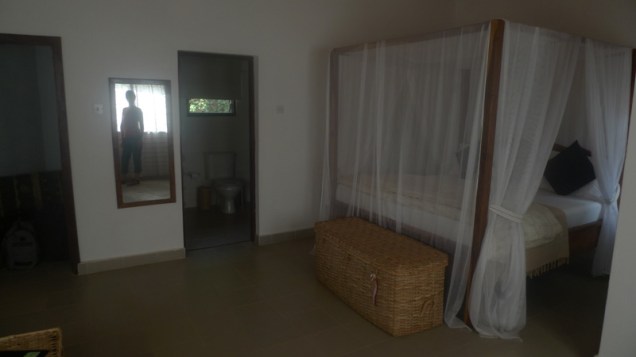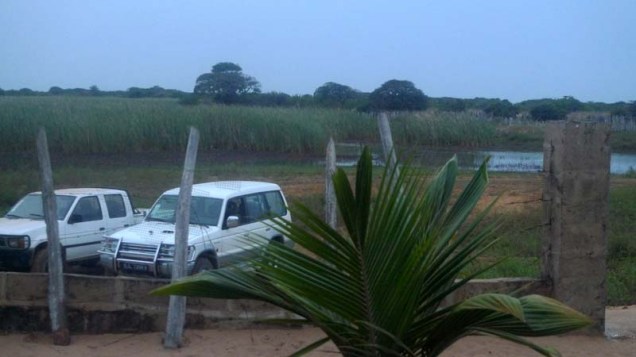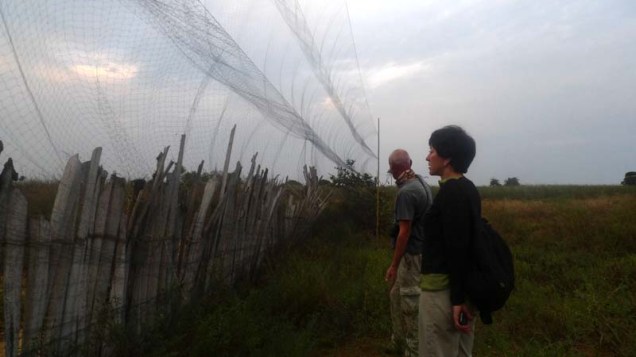Sunday, January 9
We met a man today who told us this popular synopsis of The Gambia’s genesis. It came in the early 1800s, he said, when the British had decided the slave trade was evil. Since they saw it as their mission to run the world, they sent warships up the Gambia River and claimed jurisdiction over the land that had been controlled by the French and Portuguese. Within the territory that could be bombarded by their weapons from the middle of the river, they prohibited slave-trading, and the eventual result was this funny little sliver of an English-speaking country in French West Africa, less than 30 miles wide in many places. Today it indescribably screws up commerce and transit through the western half of Senegal. The Gambia itself is even more of a mess. I’ve seen recent IMF figures that suggest the average GDP per person is only 500-some-dollars per year (less that half that of Senegal). The story made me think of current US foreign policy: well-intentioned but fraught with ghastly unintended consequences.
“The Gambia is hardly going to knock your socks off,” warns even the Rough Guide (which finds something nice to say about every country in West Africa.) The book did describe one retreat upriver that intrigued me: a chimpanzee rehabilitation and breeding center where one could stay in safari tents “with superb river views.” But when I tracked down the founder’s husband via e-mail, he shot me back a woeful tale that included his wife’s dying of cancer, the government kicking him out, and handing over the property to incompetents who had destroyed all that his wife had worked for.
I don’t remember how I heard about Farakunku, a lodge opened by an Anglo/African couple (Heather and Moses) at the beginning of 2009. Their website offered a two-night special I couldn’t resist. We had the first night here yesterday, and sadly, we’ll depart tomorrow before dawn.

I find everything about this place charming: the immaculate and beautiful cottage where we’re staying (one of only four on the property), the luxurious bed (canopied in mosquito netting), our superb meal both nights, our hosts. But what dazzled me most was our outing this morning (part of the package).

We climbed into Moses’ diesel-powered SUV before dawn and drove for about 30 minutes to the property owned by Colin Cross (the British expat who recounted that history.) A passionate birder since the age of 7, Cross (now 55), began coming to the Gambia years ago to study the birdlife here. It ranks among the richest on the planet, with more than 500 species recorded. The eccentric fellow who mentored him, another Brit with a staggering knowledge of birds, finally decided he’d had enough of the place and offered to sell Colin his house. So Colin bought it, moved here a bit less than a year ago, and only recently married his African fiancee (a celebration for which his 80-year-old mum made the journey from England.)


I felt an instant sense of rapport with Colin. Funny, iconoclastic, and friendly, he was generous with his knowledge in the way of all great teachers. Still, it was hard to absorb all he’s trying to achieve on his property, which the British Trust for Ornithology has declared an official bird observation site. Stupefyingly, it’s the only place in all of West Africa where anyone is banding birds — even though this flyway is crucial to the survival of some 50 European species. Colin has huge plans that include building quarters where ornithological volunteers will be able to help him with all manner of studies.
We only got the tiniest glimpse of the kind of work he does, but it was fascinating. We walked with him to the three nets he’s erected at various places on the property. When he’s lucky, birds fly into the nets and he can extract them and pop them into little bags that keep them calm. This morning he caught only two: an African mourning dove and a small brown variety of babbler. On his front porch, he removed each bird from its bag, placed a band around its leg, measured it, weighed it, meticulously recorded several pieces of data, and then released it. He sends all this information off to a computer in England, and over time the tiny pinpricks of information helped to fill in the picture of what’s happening to the birds in this part of the world.

Every evening Colin climbs up onto his roof with three village children and they record what kind of birds are roosting and in what numbers. The ornithologist says he also gets good results by going out into the marsh at night with a flashlight. The light stuns the birds, and he can net them that way for banding. The only hazard is that crocodiles also inhabit the property. (People worship them in this neck of the woods. I’m not joking.)
It felt awful to have to leave after spending only two hours there, but our package also included a 90-minute birdwatching outing with a Gambian ornithologist on the Allehein River, down the road from Colin’s place. There we climbed into a canoe roughly hewn from a silk cotton tree. It tipped from side to side as we were paddled through the channels of mangroves. I thought about the crocodiles. But in the end, that part of our day was probably a lot safer than the journey we face tomorrow: traveling all the way from here to St. Louis, the Senegalese city on the border of Mauritania, far to north.
